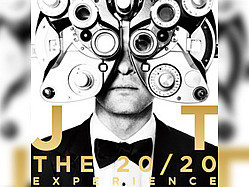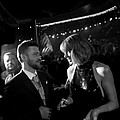Let's get one thing straight: Justin Timberlake makes music when he's ready to, not because he feels like he has to.
In one of his first wide-ranging interviews about his upcoming third solo album, The 20/20 Experience, JT spoke to a pair of high school students about making the album, his special relationship with producer Timbaland, how movies influenced the sound of the album and why his new album is more like a character study than a party album. "There are 10 songs on this one, but the average length of each song is seven, eight minutes, said JT, who released the eight-plus minute slow burner "Mirrors" just after his triumphant Grammy Awards performance. "We made it to listen from top to bottom. It's not so much a narrative or a story, but sonically we really made it to listen from top to bottom."
In the transcript of the interview held before Grammy rehearsals last week posted on Rolling Stone, Timberlake described the symbiotic relationship he has with Timbaland, who he likened to his musical brother. Painting their vibe as nearly telepathic, JT said when the pair get in the studio they don't even need to speak to get their vibe going.
"He'll start tinkering around or I'll start playing some chords and start tinking around with some loop of something and that'll give him an idea and then we'll start looping it and then I'll start humming a melody and then we just ping-pong an idea back and forth," he said. "My relationship with Tim is very unique; we share the same perspective that we always want to make something that reminds us of music that we love, but at the same time is something we've never heard before."
After years of dodging questions about when he would get back to music, Justin said he didn't tell anybody about the 20/20 sessions because he wanted to make a new album without all the expectations and hype. "'Let's just make something that feels genuine from us,'" was his motto. "And I'm glad we were able to do that way because, for me, it's the best stuff I've ever done."
Answering one of the thorniest questions his music career: why doesn't he release more music? Timberlake offered a simple answer. "I would have taken a break regardless of if I would've done films or not because my last record was all-consuming and to go on tour like that, for me, I will not be the type of artist that puts out 10 to 15 albums," he explained, saying that the whole "taking a break" thing was projected on him and not a vibe he put out there himself.
"That's just not who I am. They're really special to me," he said. "I write music all the time, but until you really feel that desperate need to shout from the rooftops and express yourself in that way, I just kind of keep it to myself. I enjoy making music so much that if it doesn't come out, that's OK."
JT said he's just as happy to listen to his new music in his car, by himself. And while the end result is always satisfying, "the journey along the way is really the most fun part, it's not about the outcome." After seemingly trading music for the movies, Timberlake said his foray into acting helped him take a slightly different approach to songwriting. "I'm gonna put a lot of music out over the course of the year and some songs have become really concept-driven; some songs have become a simple idea that turns into something big," he said.
Like one of his idols, Bob Dylan, Timberlake said he's striving to create another world to live in with his music, almost an alternate persona. Like the time he spends developing a character for a film, Timberlake said he's trying to imbue his new music with distinct traits. Pointing to one of his biggest hits, "SexyBack," JT said that song is more of a statement, a feel-good tune that gets people moving in the club, or in their cars, and makes them get into that headspace.
"But now I feel like I can encapsulate a whole world for that character, not just a statement," he said.
"Now I can really paint a picture for people 'cause being involved in the film process, you get to see the writing change, you get to see the direction change, you get to see all those things change. But you get to see those things change and you go, 'You can really do this with music, too.' You can play a character but you can also write the world that you want your character to live in and then what does that world sound like? Are there more strings in that world? Are there more horns in that world? Is there more percussion in that world?"









